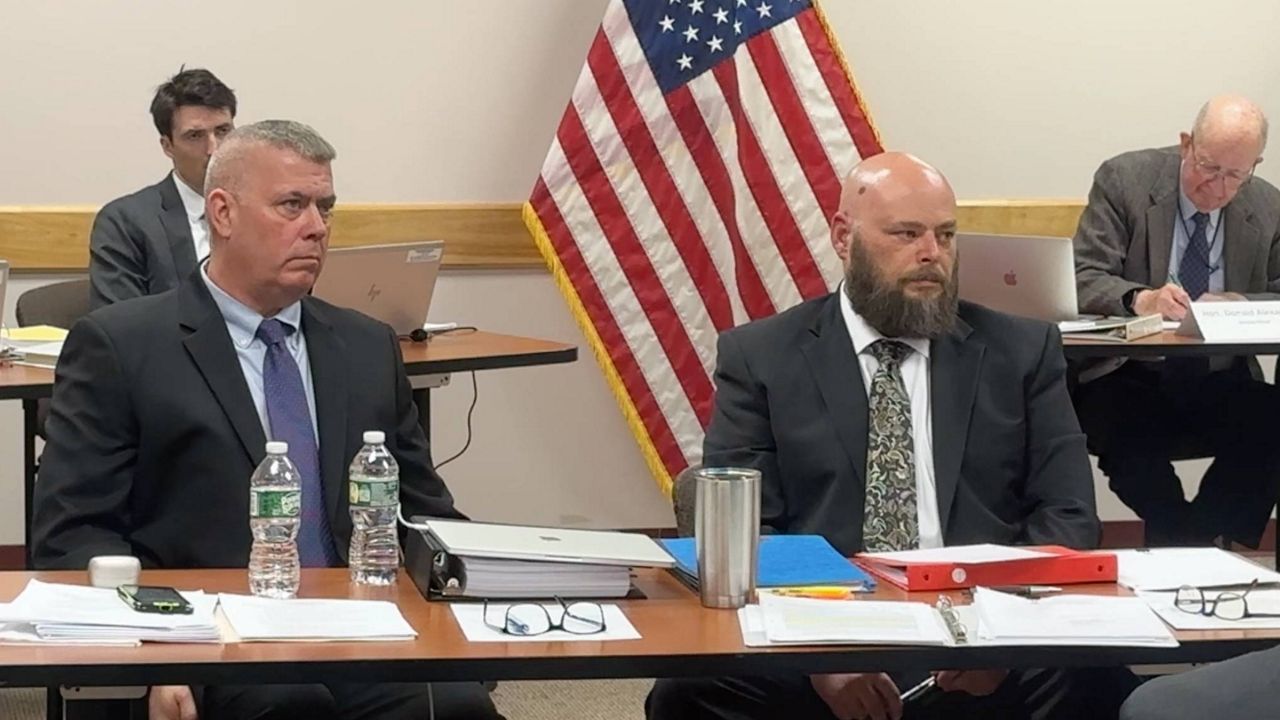Oxford County Sheriff Christopher Wainwright’s fight to keep his job began Monday in Augusta, in a hearing featuring testimony related to allegations of favoritism and unsafe disposition of firearms.
More than a dozen people sat in the audience to watch the hearing held at the Department of Public Safety’s Fallen Heroes room, which featured portraits of officers killed in the line of duty.
Retired Maine Superior Court Justice Donald Alexander presided. Gov. Janet Mills appointed him to investigate a request filed in March by the Oxford County Commissioners for Mills to remove Wainwright from office.
The commissioners are not authorized to remove Wainwright but requested that Mills act.
Wainwright has worked for the department since he was first hired as a deputy back in the 1990s. He was elected sheriff in 2018, then reelected in 2022.
Monday’s testimony referred to allegations of hostility and favoritism that have surfaced since Wainwright’s reelection. Lewiston-based attorney Amy Dieterich, who led the charge against Wainwright.
ACCUSATIONS AGAINST WAINWRIGHT
Wainwright is accused of using his authority to try to “fix” a ticket issued for operating with an open alcoholic beverage.
Wainwright is also accused of improperly disposing of firearms in the department’s evidence locker by selling them to a local firearms dealer without filing proper paperwork.
Among those testifying was Deputy Tyler Fournier. He was a rookie deputy in August 2022 when he issued a ticket to a driver on a charge of consuming alcohol in a motor vehicle on a public way.
Several months later, in November 2022, Fournier testified he was working a security detail at a Dirigo High School football game.
There, he said, Wainright approached him about the case and “discussed about if there was something to “make it right,” he said. When pressed by Dieterich, Fournier said he believed the sheriff was asking him to “fix,” or destroy, the ticket.
When Fournier voiced concerns about the issue to his supervisors, he eventually got a phone call from Wainwright. The call was recorded, and Dieterich had the recording played for the room Monday.
On the call, Wainwright first told Fournier that he has the authority to “fix” traffic tickets, saying, “Per the Attorney General’s office, I can shred any traffic ticket I want.”
Wainwright then admonished Fournier for involving other members of the department, and reminded Fournier that everyone in the department works for him.
“If I tell you not to write any (expletive) tickets ever again, you won’t write any tickets ever again. You understand?” Wainwright was heard saying on the recording.
Dieterich also called other members of the department to testify about Wainwright arranging to have firearms in the evidence locker sold off. So-called “auctions” have been held legally in years past, but usually those involved firearms the department confirmed were unwanted.
Among those testifying was Det. Michael Halacy, who said he was told not to work too hard to track down the owners of firearms in the evidence locker. When they were sold, in June and September of 2021, Halacy testified that there didn’t appear to be any formal paperwork associated with the sales.
“Was it a handshake deal?” Dieterich asked him.
“Yes,” he replied.
Wainwright took the stand, acknowledging under direct examination by his attorney Jonathan Berry that in the traffic ticket incident he was acting to protect the driver cited by Fournier.
Wainwright said he did not know her personally, but knew she was related to another woman who had terminal cancer, and that the stop in question related to a mistake that had happened when the women had gone out shopping.
Wainwright blamed his behavior during the phone call to Fournier on the stress of his reelection campaign, saying, “I allowed the emotion, the heat of that campaign to get the better of me.”
Wainwright said he regretted making Fournier and other deputies uncomfortable in the situation.
“I should never have put those deputies in that position,” he said.
Regarding the firearms sales, Wainwright admitted to Dieterich that he did not try to find forfeiture records, or records indicating the firearms were available for the department to sell, on all the firearms he ordered sold.
Wainwright told his attorney that he “absolutely” believed he had the authority to sell the firearms.
“Did you financially benefit, directly or indirectly?” Berry asked.
“Absolutely not,” Wainwright said.
Dieterich will resume cross-examining Wainwright in a follow-up hearing scheduled for Wednesday, April 24.



